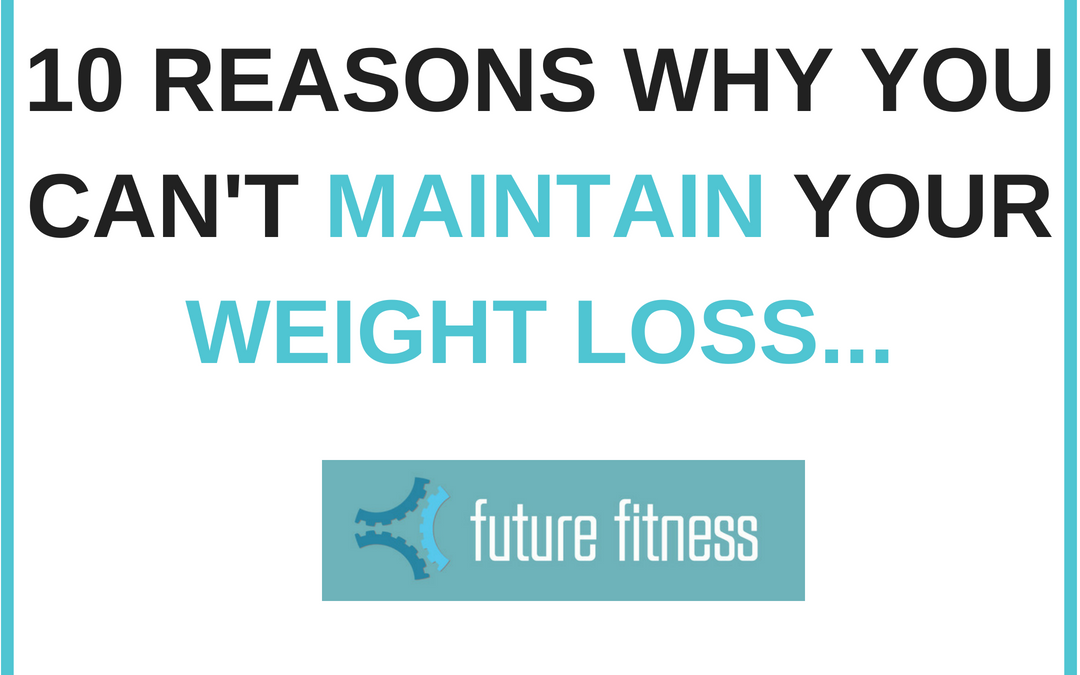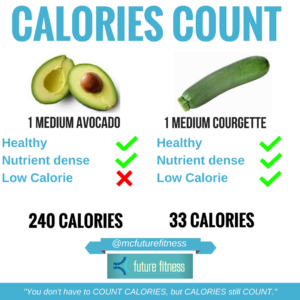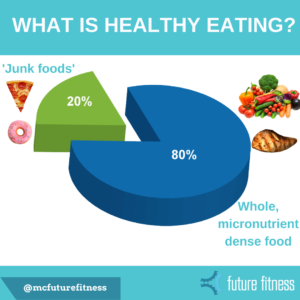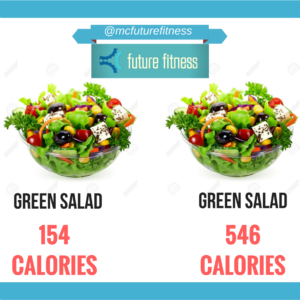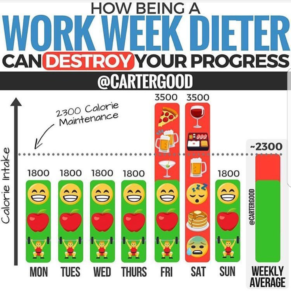Losing weight is hard!
But for many, keeping it off is even harder!!!
What people find is that when they do lose weight, they can’t maintain it!!
“It’s estimated that approximately 80-90% of dieters return to their baseline weight.”
But why does this happen so often?
Below I have outlined ten reasons (in no particular order) why I believe people struggle to maintain their weight loss.
1. You changed your habits & routine when you ended the diet.
So let’s just say, you have just finished an eight week diet! You got in to a really good routine with your meal prepping during the diet and started to develop some really good habits to help keep you on track.
A lot of people make the mistake of going back to their old habits and routines as soon as the diet finishes! When the diet ends, you should still keep the good routines going with your food choices and meal prepping etc.
No matter whether your losing, maintaining or gaining weight, your eating habits, choices and structure should stay the same. How much you eat will depend on your goals. How flexible/strict you can be with your diet will depend on your goals.Your food choices may differ depending on your goal but the way you eat and the habits/routines should stay the same.

2. The method you used to lose weight was unsustainable.
People often take really extreme approaches to dieting by creating too big a calorie deficit or cutting out major food groups!
This isn’t a sustainable way to maintain your weight loss. As soon as the diet is over, when you reintroduce these food groups, you will gain all the weight back or even more.
You need to find a method that suits you. That fits into your lifestyle. That you enjoy and can see yourself doing for the rest of your life!
For example – the keto diet where you cut out carbohydrates. No more alcohol. No sweets. No pasta. If you love all of these things, then cutting them from your diet would be silly and make you want them more resulting in a possible binge!
An easy way to know if your diet is sustainable is to imagine yourself in twelve months time. If you can’t see yourself eating the same way in twelve months, it’s not sustainable and you may need to re-think your method.
Diet doesn’t have to be a painful experience!! You want to find a way to make progress so that you can still enjoy eating some of your favourite foods from time to time.
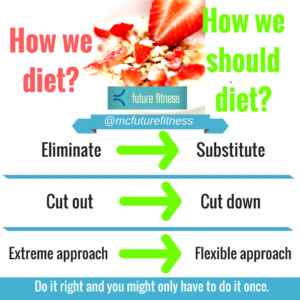
3. You don’t know how to transition out of a diet when it’s over.
When people finish a diet, it can be hard to know what to do next. Do I continue on the same calories? Do I eat more? Do I eat less?
After you finish a diet block, you will need to increase calories. If you don’t, you’re technically still dieting!
You need to set new goals and change your focus away from fat loss e.g. gaining strength, increasing fitness and so on.
You can have more flexibility with your diet but habits and routines should stay the same.
The severity of the diet will determine how quickly you need to make these adjustments with your training and nutrition. But in general making slow and incremental changes will make the transition out of dieting easier.
E.g. Going from five days cardio down to three days instead of cutting it completely.
Adding in 150-200 calories, monitoring body weight and slowly increasing over the weeks compared to just eating anything you want post-diet.

4. You didn’t actually learn anything while dieting, you just followed a plan.
The problem with most diets is that you don’t actually learn anything during it. You are just sticking to a strict plan so when it is over, you don’t know what the next step is.
In order to be a successful dieter, you need to learn about nutrition and what is in the foods you eat. You need to have an awareness of calories and macros (proteins, fats, carbohydrates).
You need to learn and understand the process of how a diet works and the principles behind any successful diet. You don’t need an expert level knowledge but a foundation of the basics will allow you to understand the principles and how to apply them to your own life and diet.
5. You keep trying to diet forever. (Which is leading you to not being able to adhere to your diet, overeating & binging).
Dieting should be done in phases or blocks! You can’t diet for 52 weeks of the year!!
Physically – your body will do things to stop it happening.
Mentally – losing weight is a mental stress and takes a toll on you.
Environmentally – there will be social situations and times when losing fat/weight is just not going to happen and it’s not the right thing to try and do (e.g. Christmas, holidays).
This is why learning how to maintain your weight and picking the right times to try to lose weight is so important.
You want to set yourself up to give yourself the best chance of succeeding.
People often only think in the short term when it comes to weight loss not the long term.
By organizing your diet into blocks that coincide with your life, you can set realistic and achievable goals.
Too many people set themselves up for failure.
By organising your diet into blocks that coincide with your life you can set realistic and achievable goals.
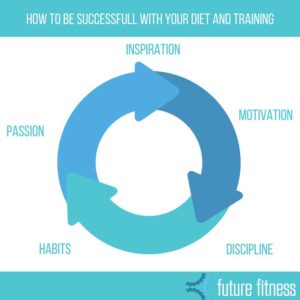
6. You are being too strict with your diet when you don’t need to be. (Which is leading you to not being able to adhere to your diet, overeating & binging).
Too many people take extreme and strict approaches to dieting.
For example, chocolate is your favourite food! You cut all chocolate from your diet.
What happens when you do this?
You want it more!!
Eventually cravings will give in and you will eat every bit of chocolate in sight because you are tired and hungry.
If you love chocolate, you don’t need to cut it from your diet t!! Practice restraint not restriction. Use a flexible approach to dieting.
With flexible dieting, I like to use an 80/20 or 90/10 rule. So 80 to 90% of your day’s food should come from nutritious, whole food sources. The other 10-20% can come from the not so ‘healthy’ things such as chocolate, sweets, biscuits or anything that will satisfy cravings and and help with diet adherence.
7. You are being too flexible with your diet/food choices which is causing you to overeat.
The opposite side of this then is that you are being too flexible. You need to realize that you will need to hold some form of discipline in order to keep on track to reaching your goals!!
You need to be able to say no sometimes as well as yes!!
Set a plan in place. For example limiting treats or meals out. Allow yourself one meal out per week rather than eating out a few days a week.
How flexible or strict you are will determine progress! Think about your goals and what exactly it is you want to achieve.
8. You are unaware of how much food you are actually consuming everyday.
Studies show that we underestimate what we eat in a day by about 30%. We are really bad at estimating what exactly it is we are eating every day.
Most people do not have an awareness of calories and macronutrients.
Apps such as myfitnesspal can be great tools to help us learn more about the foods we eat on a daily basis.
Keeping a food diary and logging your meals will help you be more aware of how much food you are eating.
Also weighing out food using a food scales so that you can develop an awareness of what an actual portion is.
See info graphic below. Both salads look the same but just by adding dressing, you have increased the over all calorie content of the meal.
9. Your ‘cheat day’ is putting your weekly average calories too high & you are gaining weight.
Cheat meals or days can give you a very bad relationship with food. No food should be labelled ”good” or ”bad”. You shouldn’t feel the need to pig out once a week if you are eating a well balanced diet.
Cheat meals encourage excessive consumption and binge eating.
It creates a vicious binge/restrict cycle. One meal/day can totally take you out of your calorie deficit so it seems crazy that you would work so hard for 6 days to undo it all in one day.
If you want something nice, you shouldn’t have to feel guilty about having it. Moderation is key to diet adherence. If you love chocolate, 10-20% of your daily calories could be used for a a chocolate bar. That way you are in control and won’t feel the need to binge.
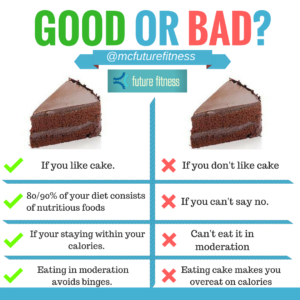
10. Your weekend habits are shit. Calories still count on the weekends.
A lot of people seem to forget this. They work hard towards their goals Monday to Friday and then the weekend comes and all habits/routines go out the window!
Just because you are out of routine, doesn’t mean you should go completely off track and eat what you like!! You might have plans for dinner or drinks on one of the evenings but try to compensate elsewhere so that you can allow for the extra calories.
Post from @cartergood
So there are some of the reasons I believe people to struggle to maintain their weight loss. Let me know what you think and if there are any more you can think of.
If you liked this article, I’d really appreciate if you could share it with a friend!
Coach Matt

